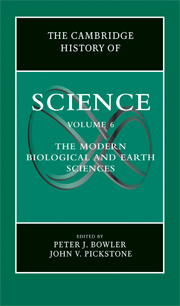30 - Biology and Human Nature
from PART IV - SCIENCE AND CULTURE
Published online by Cambridge University Press: 28 November 2009
Summary
In traditional Christian thought, the soul and the bodywere distinct from one another: If behavior was affected by animal impulses, this merely indicated that the soul did not have sufficient control over its fleshly garment. Descartes’ insistence that the mind existed on a separate plane from that of the body – the latter being conceived of essentially as a machine – continued the dualistic interpretation. In such a model, psychology and the social sciences would constitute a body of knowledge with no link to biology. The workings of the mind could be investigated by introspection without reference to the body. The dualistic perspective came under fire in the eighteenth century, as materialist philosophers such as Julien Offray de la Mettrie argued that the mind was affected by the body. They implied that the mind should be treated as nothing more than a by-product of the physical processes going on in the brain. For the materialists, human nature was essentially biological. The conflict between dualism and materialism was renewed in the nineteenth century as developments in biology began to offer a range of techniques for investigating human behavior. There was not, however, a complete triumph of the materialistic approach. Efforts to preserve the mind as a distinct level of activity have continued, partly in defense of the concept of the soul but increasingly as a means of creating a professional niche for psychology and the social sciences.
- Type
- Chapter
- Information
- The Cambridge History of Science , pp. 563 - 582Publisher: Cambridge University PressPrint publication year: 2009



